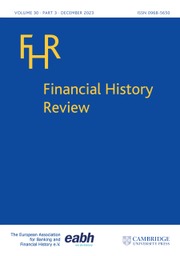Article contents
‘Putting Mexico on its feet again’: the Kemmerer mission in Mexico, 1917–1931
Published online by Cambridge University Press: 11 June 2019
Abstract
This article scrutinizes the results of the mission carried out by Edwin Walter Kemmerer in Mexico during 1917. Based on unpublished materials from his private archive, as well as other Mexican archives, this article analyses the process of approval, installation and implementation of the reforms introduced by Kemmerer's mission in Mexico. It is argued that Kemmerer's work as a financial advisor for Venustiano Carranza was not a total failure, as the existing literature on the subject claims. Indeed, on the eve of Great Depression, Mexico exhibited the main institutional features of ‘Kemmererized’ countries: a central bank, the gold standard and a centralized tax system. It is also suggested that the economic knowledge brought into the country by the money doctor moulded the ideological foundation of the new financial and economic elite of revolutionary Mexico.
- Type
- Articles
- Information
- Copyright
- Copyright © European Association for Banking and Financial History e.V. 2019
Footnotes
This article is an extension of chapter 3 of my PhD dissertation on the history of the gold standard in Mexico. I am grateful to Graciela Márquez Colín, Aurora Gómez Galvarriato, Sergio Silva Castañeda, Carlos Marichal and Pablo Martín Aceña for their comments. I also thank the editor, Rui Pedro Esteves, and two anonymous reviewers for their many valuable suggestions on an earlier draft of this article. All remaining errors are of course mine.
References
Sources
References
- 3
- Cited by


